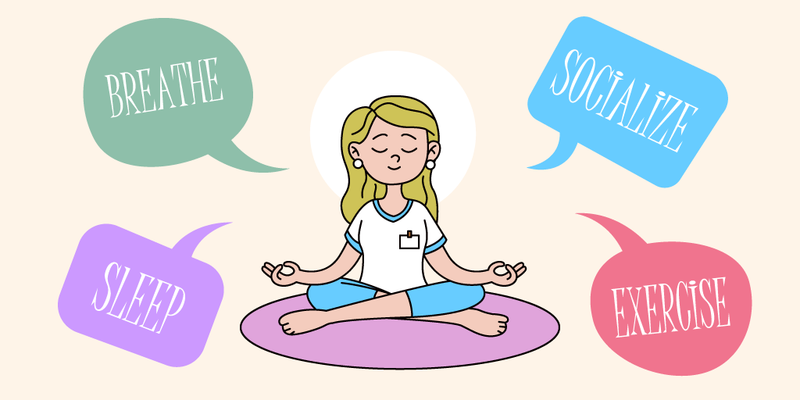
Stress is an unavoidable part of life that can impact our physical, emotional, and mental well-being. Finding healthy ways to manage and cope with stress is crucial for maintaining a balanced and fulfilling life. In this article, we will explore the importance of mastering stress management techniques and how they can positively impact various aspects of our lives.
Understanding Stress
Stress can be defined as the body's response to changes that require an adjustment or response. It can manifest in various forms, such as acute stress, which is short-term and immediate, and chronic stress, which is long-term and ongoing. The causes of stress are diverse and can stem from work pressures, financial concerns, personal relationships, health issues, and more. The impact of stress on our physical and mental health cannot be underestimated, as prolonged periods of stress can lead to anxiety, depression, heart problems, and other serious health conditions.
Identifying Personal Stress Triggers
Self-awareness is key when it comes to managing stress effectively. Understanding what triggers stress in our lives can help us take proactive steps to address and mitigate those triggers. Common stress triggers include deadlines, conflicts, financial worries, and relationship issues. Keeping a stress journal can be a helpful tool in identifying patterns and triggers. If needed, seeking professional help from a therapist or counselor can provide additional support in managing stress triggers.

Stress Management Techniques
Physical Stress Management Techniques
Physical well-being is closely linked to mental health, and incorporating physical stress management techniques can have a significant impact on overall stress levels. Regular exercise, such as yoga, running, or swimming, can help release endorphins and reduce stress hormones. Maintaining healthy eating habits and ensuring sufficient sleep are also important factors in managing stress. Practicing relaxation techniques like deep breathing, meditation, or progressive muscle relaxation can aid in calming the mind and body.

Emotional Stress Management Techniques
Emotional well-being plays a crucial role in managing stress. Engaging in hobbies and activities that bring joy and relaxation can help alleviate stress. Seeking support from friends and family members during challenging times can provide emotional comfort and reassurance. Practicing gratitude by keeping a daily gratitude journal or expressing appreciation for the good things in our lives can shift our focus from negativity to positivity. Setting boundaries in relationships and learning to say no when overwhelmed can also help manage emotional stress effectively.
Mental Stress Management Techniques
Managing mental stress involves strategies that improve cognitive function and mindset. Effective time management, prioritizing tasks based on importance, and creating a daily schedule can help reduce feelings of overwhelm. Engaging in mindfulness practices, such as meditation or mindful breathing, can foster present-moment awareness and reduce anxiety. Cognitive restructuring, which involves challenging negative thought patterns and replacing them with positive affirmations, can enhance mental resilience and reduce stress levels.
Implementing Stress Management Techniques
To effectively manage stress, it is essential to develop a personalized stress management plan tailored to individual needs and preferences. Setting realistic goals and expectations when implementing stress management techniques is key to long-term success. Consistency and practice are crucial in establishing new habits and coping mechanisms. It is also important to be flexible and adjust techniques as needed based on changing circumstances and stress levels.
Benefits of Mastering Stress Management Techniques
The benefits of mastering stress management techniques are far-reaching and can positively impact various aspects of our lives. Improved physical health, including a stronger immune system and reduced risk of chronic diseases, can result from effective stress management. Enhanced mental well-being, such as reduced anxiety and improved focus, can lead to a greater sense of overall happiness and fulfillment. Better relationships with friends, family, and coworkers are often a byproduct of effective stress management, as improved emotional regulation and communication skills are cultivated. Increased productivity and efficiency in work and daily tasks can also be achieved through reduced stress levels, leading to a more satisfying and balanced life.
Conclusion
In conclusion, mastering stress management techniques is essential for achieving a balanced and fulfilling life. By understanding the nature of stress, identifying personal triggers, and implementing a combination of physical, emotional, and mental stress management techniques, individuals can positively impact their overall well-being. The benefits of effective stress management are numerous, including improved health, enhanced relationships, and increased productivity. Taking proactive steps to manage stress and prioritize self-care can lead to a life filled with greater resilience, happiness, and peace of mind. Start incorporating stress management techniques into your daily routine and empower yourself to live a life free from the burdens of stress.
FAQs
Q: What is stress and why is it important to manage it effectively?
A: Stress is the body's response to changes that require an adjustment or response. It is important to manage stress effectively because prolonged stress can lead to physical and mental health issues, including anxiety, depression, and heart problems.
Q: How can I identify my personal stress triggers?
A: Self-awareness is key in identifying personal stress triggers. Keeping a stress journal, seeking professional help if needed, and paying attention to patterns can help in recognizing stress triggers.
Q: What are some physical stress management techniques that can help reduce stress levels?
A: Physical stress management techniques include regular exercise, maintaining healthy eating habits, ensuring sufficient sleep, and practicing relaxation techniques like deep breathing, meditation, or yoga.
Q: How can I manage emotional stress effectively?
A: Managing emotional stress involves engaging in activities that bring joy, seeking support from friends and family, practicing gratitude, setting boundaries in relationships, and learning to say no when overwhelmed.
Q: What are some mental stress management techniques I can use to improve cognitive function?
A: Mental stress management techniques include effective time management, mindfulness practices like meditation, and cognitive restructuring to challenge negative thought patterns and replace them with positive affirmations.


0 Comments